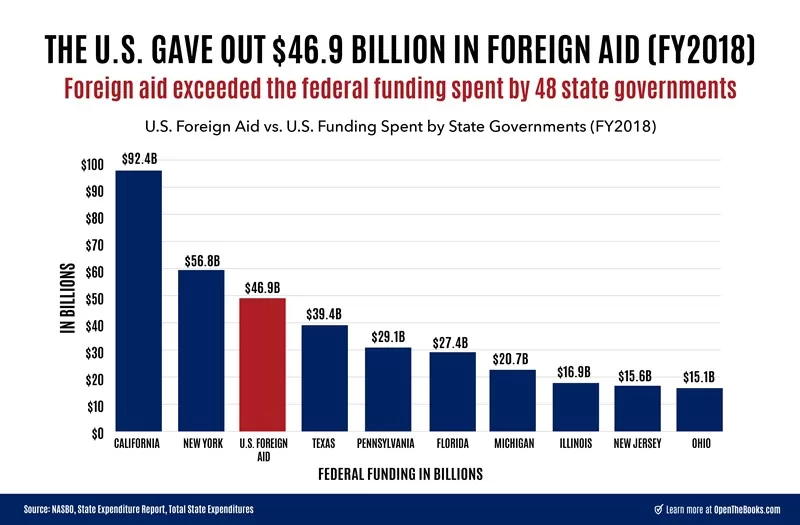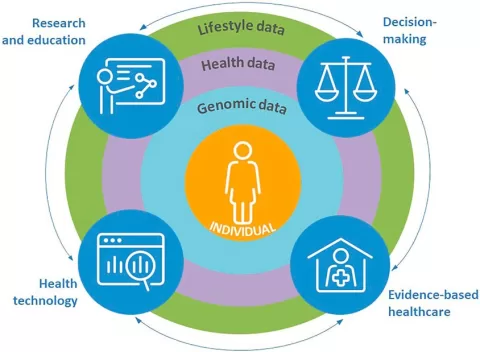Foreign aid funding has become a critical topic in recent discussions, especially in light of recent polls revealing public opinion on the matter. A significant two-thirds of Americans contend that cuts to the US Agency for International Development (USAID) will exacerbate health crises globally, potentially increasing illness and even fatalities in low-income regions. Despite this, nearly half of the respondents believe that such cuts would alleviate the national deficit and provide more resources for domestic priorities. This notion, however, is largely founded on misconceptions regarding the actual proportion of federal funding dedicated to foreign assistance, which is just 1% of the budget — a figure that dramatically alters perceptions once it’s understood. With the Supreme Court now demanding the Trump administration to end a 90-day freeze on foreign aid funding, the impact of foreign aid remains a pressing concern for both domestic and international health and humanitarian issues.
The conversation surrounding international assistance and humanitarian aid is gaining momentum, especially with the recent shift in public sentiment regarding global support initiatives. This recent poll highlighted the stark contrast in views when foreign aid is framed as global health spending, with a remarkable 67% of Americans acknowledging the potential harmful effects of cutting USAID on health outcomes in impoverished countries. As debates intensify over the allocation of resources, understanding the implications of foreign assistance becomes ever more crucial. The complexities of these discussions are further compounded by the notion that a significant portion of the public greatly overestimates the fiscal commitment to these programs, revealing a disconnect that could determine future funding decisions. In light of these factors, analyzing the role and importance of foreign aid is essential not just for global welfare, but also for informed policy-making domestically.
Understanding the Cuts to USAID and Their Global Impact
The recent KFF poll sheds light on American perceptions regarding the cuts to the United States Agency for International Development (USAID), revealing a stark apprehension about the implications these reductions pose for global health. Approximately two-thirds of Americans believe that decreasing funding for USAID will lead to an uptick in illness and mortality, especially in low-income countries. This belief underscores a growing concern that foreign aid is not merely charity but a vital component of global health infrastructure. Respondents, after being informed that foreign aid only represents about 1% of the federal budget, realized that their previous estimates—often inflated—indicate a misunderstanding of America’s commitment to international aid and health.
The poll results suggest that a significant portion of the population fears the consequences of cutting back on funding aimed at supporting global health initiatives. As the Supreme Court compels the Trump administration to end the freeze on foreign aid funding, it becomes increasingly clear that foreign aid serves as a lifeline to some of the most vulnerable populations around the world. The findings provoke critical questions about the future of U.S. foreign aid, the necessity of maintaining funding levels for programs under USAID, and the collective responsibility of the United States as a global leader in humanitarian efforts.
The Misconceptions Around US Foreign Aid Spending
One striking finding from the KFF poll is the pervasive misconception about how much the U.S. actually spends on foreign aid. With average estimates from respondents pegging foreign aid at 26% of the federal budget, the truth reveals a staggering misunderstanding of governments’ allocation priorities. In reality, only about 1% of the federal budget goes towards foreign aid, which significantly skews public perception and impacts policy decisions related to global health spending. Understanding this discrepancy is essential for fostering informed public debates on fiscal responsibility and international assistance.
The overestimation of foreign aid spending reflects not only a lack of information but also a cycle of skepticism regarding U.S. involvement abroad. When misinformed on actual expenditure, Americans tend to oppose foreign aid initiatives, as evidenced by the poll results where 58% believed the U.S. allocates too much to foreign aid. However, when presented with the factual figure, support for foreign aid increased, highlighting the critical need for proper public education regarding U.S. contributions to global health and humanitarian efforts.
Public Support for Global Health Spending
As the poll indicates, public support for foreign aid, often referred to as global health spending, emerges dramatically when respondents are educated about the stakes involved. A substantial majority, 67%, believe that cuts to USAID will exacerbate health crises in poorer nations, shedding light on the importance of these programs. This shift underscores how labeling aid as a necessity for global health can significantly sway public opinion in favor of maintaining or even increasing funding.
Moreover, the data illustrates that a focus on the humanitarian impact of aid resonates deeper with citizens across political alignments. The KFF conclusions reveal a poignant understanding that healthcare and humanitarian assistance, crucially funded through agencies like USAID, can mitigate suffering and foster better living conditions in low-income nations. The challenge, however, lies in bridging the gap between misperceptions about aid expenditure and the irrefutable truth of its importance, thereby advocating more robust support for global health initiatives.
The Role of the Supreme Court in Foreign Aid Discussions
In a pivotal decision, the Supreme Court mandated the Trump administration to lift the freeze on foreign aid funding, which had significant implications for programs managed by USAID and the State Department. The justices recognized the pressing need for clarity regarding the federal government’s responsibilities in managing aid allocations. This development is crucial, given the overwhelming public sentiment captured in the poll which indicates that the perception of aid as an enabler of global health should take precedence over political maneuvers.
The Supreme Court’s involvement highlights the legal and ethical dimensions of foreign aid funding. By urging an end to the 90-day freeze, the court acknowledges that the repercussions of withholding funds could lead to increased humanitarian crises. As the case unfolds, it serves as a reminder of the integral role that foreign aid plays in ensuring global health and stability, reinforcing the notion that actions taken at the governmental level should reflect a commitment to aiding those in dire need.
The Economic Argument for Sustaining Foreign Aid
Amidst debates on U.S. foreign aid cuts, the economic argument for sustaining such funding remains compelling. While many believe that reducing foreign aid will help reduce the national deficit and fund domestic programs, surveys indicate that such cuts could paradoxically lead to longer-term costs. Investments in global health initiatives can foster stability abroad, prevent the spread of diseases, and ultimately alleviate burdens on U.S. healthcare systems. Countries with robust health supports are less likely to experience crises that could lead to broader economic impacts for the United States as well.
Moreover, the economic implications of USAID cuts extend beyond immediate health concerns. The funding provided to vulnerable communities through foreign aid creates avenues for trade relationships and secures strategic international partnerships that benefit the U.S. economy. Critics often overlook that sustained foreign aid is not merely an expenditure but, rather, a long-term investment in global well-being that can yield significant diplomatic and economic returns in a globalized world.
A Call for Transparency in Foreign Aid Spending
Transparency in foreign aid spending is crucial to fostering informed public opinion and engendering trust in the processes behind U.S. funding allocations. The KFF poll illustrates a clear need for communicative efforts to address misconceptions about aid budgets. By revealing the true proportions of foreign aid within the federal budget, policymakers can work to demystify financial allocations and provide a clearer picture of how these investments serve to enhance global health and security.
Adopting measures for accountability and transparency could also thwart potential misgivings or misinformation regarding foreign aid expenditures. When Americans understand that these funds represent only a small fraction of the total budget yet have significant positive impacts overseas, support for initiatives like USAID could rise. Increased transparency not only builds public confidence but also encourages greater participation in dialogue surrounding the importance of maintaining robust foreign aid programs for global health.
The Impact of Public Opinion on Foreign Aid Policy
Public opinion plays an influential role in shaping foreign aid policy, as evidenced by recent polls illuminating American perceptions towards organizations like USAID. The findings suggest a broader trend where improved understanding of the benefits of foreign aid could shift opinions significantly. For policymakers, this highlights the need to engage the public openly regarding the impacts of foreign aid funding on global health and humanitarian crises.
As constituents become more informed about the realities of foreign aid expenditure, the call for responsible and sustained funding becomes louder. Politicians must acknowledge that public sentiment is crucial for the longevity of aid initiatives. Engaging communities through education on the tangible benefits of foreign aid can not only mitigate misconceptions but also galvanize support for continued funding. Therefore, fostering an informed citizenry is essential for the advancement of effective foreign aid policies that prioritize global health.
Reassessing the Value of Foreign Aid in Modern Context
In light of recent events surrounding USAID and foreign aid funding, there is an urgent need to reassess the value placed on foreign aid within the contemporary political landscape. Despite common misconceptions often led by political rhetoric, empirical evidence suggests that foreign aid is vital for addressing global challenges such as pandemics, climate change, and humanitarian crises. Recognizing the role of foreign aid in promoting health and stability offers a counter-narrative to calls for drastic budget cuts.
The global landscape continuously evolves, demanding that U.S. foreign aid adapt accordingly. By investing in global health initiatives, the U.S. not only fulfills its moral obligations but also positions itself as a reliable partner in addressing pressing global issues. The KFF poll clearly demonstrates that when citizens are made aware of the true impact and necessity of foreign aid, support increases, which is a crucial insight for fostering sustained aid commitments in an ever-changing world.
Conclusion: The Future of Foreign Aid and Global Health
The findings from the KFF poll serve as a pivotal reminder of the intertwined relationship between public perception and foreign aid policy. As foreign aid funding continues to be at the forefront of national discussions, addressing misconceptions and highlighting the value of aid in promoting global health will be integral to securing domestic support for international efforts. Stakeholders must advocate for transparent communication strategies that illustrate how foreign aid is a necessary investment for a healthier future both at home and abroad.
Looking ahead, the potential consequences of reducing foreign aid cannot be overstated. The critical role that organizations like USAID play should prompt a re-evaluation of how citizens and policymakers approach the discourse surrounding foreign aid spending. Emphasizing the positive outcomes of such expenditures can pave the way for augmented support and a renewed commitment to global health initiatives that will ultimately benefit all.
Frequently Asked Questions
What are the potential consequences of USAID cuts on global health spending?
Cuts to USAID could significantly impact global health spending, as the agency plays a crucial role in funding healthcare initiatives in low-income countries. A recent poll indicated that 67% of Americans believe that reducing USAID funding would lead to increased illness and death globally. These cuts could exacerbate health crises in vulnerable populations, highlighting the importance of maintaining foreign aid investments.
How does public perception of US foreign aid funding affect policy decisions?
Public perception greatly influences policy decisions regarding US foreign aid funding. According to a KFF poll, many Americans overestimate foreign aid’s share of the federal budget, believing it accounts for 26% when it actually represents only about 1%. When informed of this fact, support for foreign aid increases significantly, especially among Republicans and independents, demonstrating that education on foreign aid funding can alter public opinion and potentially shape future policies.
Why is foreign aid funding vital for humanitarian crises?
Foreign aid funding is essential for addressing humanitarian crises worldwide. The recent poll suggests that 62% of Americans believe cutting USAID will lead to more humanitarian crises. This funding supports life-saving initiatives, including disaster response, healthcare, and sanitation, in regions facing challenges such as poverty and conflict. Maintaining adequate foreign aid is crucial to reduce suffering and promote global stability.
What impact do USAID funding cuts have on the US economy?
While some believe that cutting USAID funding will reduce the deficit and help fund domestic programs, research shows that such cuts can have adverse effects on the US economy. By undermining global health efforts and humanitarian assistance, reduced foreign aid can lead to increased instability abroad, which ultimately impacts national security and economic interests at home. Poll respondents significantly underestimated foreign aid’s fiscal role, indicating a need for better public understanding of its economic implications.
What role does public opinion play in debates about US foreign aid?
Public opinion plays a critical role in debates about US foreign aid. The KFF poll revealed that many Americans support foreign aid when it is framed as global health spending. Changing the narrative around foreign aid can shift public sentiment, as demonstrated by the higher percentage of support when individuals are informed about the actual budget allocation. Policymakers often take public opinion into account when crafting legislation related to foreign aid funding.
What trends are emerging regarding the future of foreign aid funding in the US?
Emerging trends suggest increased scrutiny and debate over foreign aid funding in the US. Recent developments, such as the Supreme Court’s ruling to lift the freeze on foreign aid and the negative public sentiment towards aid cuts, indicate ongoing challenges and opportunities for advocacy groups. As more citizens become aware of the true scope and impact of foreign aid funding, there may be a shift towards more robust support for these essential programs.
| Key Points |
|---|
| Two-thirds of Americans believe cutting USAID will increase illness and death globally. |
| 47% think dissolving USAID will lower the deficit and fund domestic programs. |
| Survey conducted with 1,322 adults from February 18 to 25, 2023. |
| Respondents overestimate foreign aid spending, guessing it to be 26% of the federal budget. |
| 58% believe the U.S. spends too much on foreign aid; this drops to 34% when actual spending (1%) is revealed. |
| Support for foreign aid rises to 67% when referred to as global health spending. |
| 62% believe cutting USAID will result in more humanitarian crises. |
| The Supreme Court ordered the Trump administration to lift its 90-day freeze on foreign aid. |
| Lawsuits challenge the funding freeze, claiming it harms vulnerable communities. |
Summary
Foreign aid funding remains a critical topic, as evidenced by the recent KFF poll indicating significant public concerns about the impact of cuts to USAID. With two-thirds of Americans fearing that reducing foreign aid will lead to increased illness and humanitarian crises worldwide, it is clear many recognize the essential role these funds play in global health and stability. The discussion continues amidst legal battles surrounding funding freezes and the Supreme Court’s mandate to resolve these issues, highlighting the ongoing importance of foreign aid in supporting some of the most vulnerable populations globally.
The content provided on this blog (e.g., symptom descriptions, health tips, or general advice) is for informational purposes only and is not a substitute for professional medical advice, diagnosis, or treatment. Always seek the guidance of your physician or other qualified healthcare provider with any questions you may have regarding a medical condition. Never disregard professional medical advice or delay seeking it because of something you have read on this website. If you believe you may have a medical emergency, call your doctor or emergency services immediately. Reliance on any information provided by this blog is solely at your own risk.








